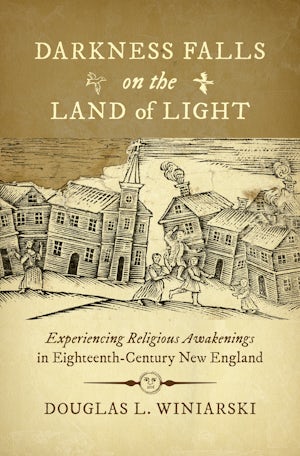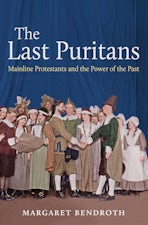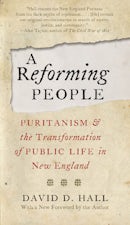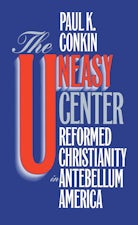Darkness Falls on the Land of Light
Experiencing Religious Awakenings in Eighteenth-Century New England
By Douglas L. Winiarski
632 pp., 6.125 x 9.25, 27 halftones, 6 maps, 1 graph, 9 tables, notes, index
-
Paperback ISBN: 978-1-4696-5227-6
Published: February 2019 -
E-book EPUB ISBN: 978-1-4696-2827-1
Published: February 2017 -
E-book PDF ISBN: 979-8-8908-8369-8
Published: February 2017 -
Hardcover ISBN: 978-1-4696-2826-4
Published: March 2017
Published by the Omohundro Institute of Early American History and Culture and the University of North Carolina Press
Buy this Book
- Paperback $34.95
- Hardcover $55.00
- E-Book $29.99
For Professors:
Free E-Exam Copies
Published by the Omohundro Institute of Early American History and Culture and the University of North Carolina Press
Awards & distinctions
Bancroft Prize, Columbia University
Finalist, 2018 George Washington Prize
2018 New England Society Book Award in Nonfiction, New England Society in the City of New York
A CHOICE Outstanding Academic Title, 2017
Book of the Year, Jonathan Edwards Center, Trinity Evangelical Divinity School
2018 Peter J. Gomes Memorial Book Prize, Massachusetts Historical Society
The 1740s and 1750s were the dark night of the New England soul, as men and women groped toward a restructured religious order. Conflict transformed inclusive parishes into exclusive networks of combative spiritual seekers. Then as now, evangelicalism emboldened ordinary people to question traditional authorities. Their challenge shattered whole communities.
About the Author
Douglas L. Winiarski is professor of religious studies and American studies at the University of Richmond.
For more information about Douglas L. Winiarski, visit
the
Author
Page.
Reviews
“[T]he most compelling history of the Awakening in New England we have. . . . Nowhere else in studies of religious practice in early America is social behavior so thoroughly mapped. And nowhere else have vernacular descriptions of religious experience been so acutely analyzed.”—David D. Hall, in Church History: Studies in Christianity and Culture
“By parsing the distinctive vocabularies and rich tropes that ordinary New Englanders devised to describe their tumult within, [Winiarski] lends freshness and immediacy to the familiar narrative of the Awakening.”—Christine Heyrman, in Reviews in American History
“Winiarski brings new life to eighteenth-century religion. Perhaps as significantly, he sets a high bar for the use of compelling narrative and imaginative prose in the writing of early American history . . . [T]hrough his expert presentation of lived experience, he has at last made the stories of the awakened as compelling as those of the awakeners.”—Peter Manseau, in Journal of the American Academy of Religion
“Essential reading for students of early American ‘evangelicalism.’”—John Turner, Patheos
“Admirably models how the methods and gaze of lived religion can expand and humanize well established narratives.”—Reading Religion
“[Winiarski] weaves together biographies of believers seeking spiritual refreshment and by turns finding in New England's established religion a font of joy or an empty, arid, and spiritless desert. Essential.”—Choice




